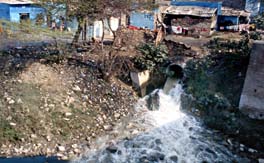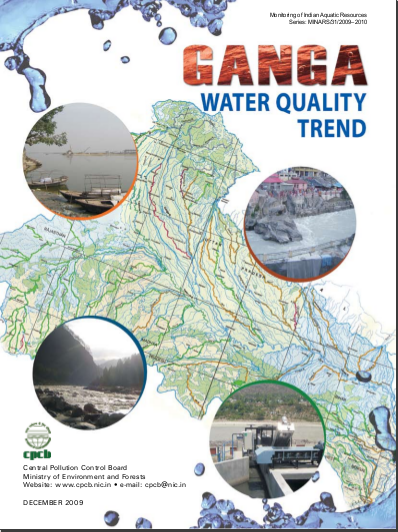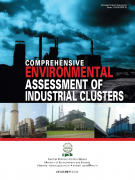Central Pollution Control Board (CPCB)
River water quality data by Central Pollution Control Board (2005)
Posted on 19 Mar, 2013 06:41 PMAgainst this backdrop, this document by the Central Pollution Control Board (CPCB) elaborates on the river water quality in India. The Central and State Pollution Control Boards / Pollution Control Committees in Union-Territories of India are responsible for restoration and maintenance of the wholesomeness of aquatic resources.
Guidelines on environmental management in industrial estates- A report by Central Pollution Control Board, Ministry of Environment & Forest
Posted on 01 Sep, 2012 07:33 PMThis report by Central Pollution Control Board sheds light on the guidelines meant for environmental protection for new industrial estates and up gradation of pollution control systems for existing industrial estates.
Status of groundwater quality in India - Report of the survey conducted in metropolitan areas by the CPCB
Posted on 24 Nov, 2011 05:36 PMThe report recognises that most groundwater quality problems are anthropogenic in origin, caused by a combination of over-exploitation and infiltration of wastes. Inadequate infrastructure and resources mean that waste generated by cities and industrial areas is not properly collected, treated and disposed, thus leading to grondwater contamination.
Guidelines for water quality management and monitoring by Central Pollution Control Board (2008)
Posted on 23 Nov, 2011 05:14 PMThe documents titled 'Guidelines for water quality management' and 'Guidelines for water quality monitoring' are published by the Central Pollution Control Board (CPCB) in 2008, under the guidance of the Water Quality Assessment Authority formed under the Ministry of Environment and Forests (MoEF).

Status of water quality in India – reports by Central Pollution Control Board for 2007, 2008 and 2009
Posted on 14 Nov, 2011 04:42 PMDecentralised treatment and recycling of domestic wastewater - An integrated approach to water management - A pilot project - CPCB (2008)
Posted on 27 Oct, 2011 10:32 AMThis report by the Central Pollution and Control Board (CPCB) describes the various intervention measures chosen to reduce the ecological footprint of the Sangamam housing project at Auroville. These measures include water harvesting, recycling and waste management.
Polluted river stretches in India: Criteria and status - A report by Central Pollution Control Board
Posted on 04 Oct, 2011 10:53 PMThis brief report by the Central Pollution Control Board (CPCB) presents an analysis of the monitoring of the water quality in India under the National Water Quality Monitoring Programme. The water quality data for the years 2002-2008 has been analysed and monitoring locations exceeding the water quality criteria have been identified as polluted locations with respect to risk.
Water and wastewater analysis – A guide manual by Central Pollution Control Board
Posted on 03 Oct, 2011 10:14 PM This guide manual on water and wastewater analysis prepared by the Central Pollution Control Board (CPCB), caters to the need of evolving a simplified code of practice for the lab
This guide manual on water and wastewater analysis prepared by the Central Pollution Control Board (CPCB), caters to the need of evolving a simplified code of practice for the lab
Ganga water quality trend - A report by Central Pollution Control Board (2009)
Posted on 30 Apr, 2011 05:39 PM The data has been collected over a period of many years from 39 water quality monitoring stations along the main river and 102 stations on its tributaries which were setup in 2008/09.
The data has been collected over a period of many years from 39 water quality monitoring stations along the main river and 102 stations on its tributaries which were setup in 2008/09.
The study focuses on the parameters for dissolved oxygen, (DO), biochemical oxygen demand (BOD) and faecal coliforms (FC) as these indicate the biological health of the river. The period of study for the river Ganga is 1999-2008. The study finds that most of the water quality parameters studied do not meet the standards.
48% industrial clusters in India are critically polluted: CPCB
Posted on 10 Aug, 2010 11:38 PM A Comprehensive Environmental Pollution Index (CEPI) is a very useful tool to capture the health dimensions of the environment including air, water and land. The CEPI is intended to act as an early warning tool and can help in categorising the industrial clusters/areas in terms of priority of planning needs for interventions.
A Comprehensive Environmental Pollution Index (CEPI) is a very useful tool to capture the health dimensions of the environment including air, water and land. The CEPI is intended to act as an early warning tool and can help in categorising the industrial clusters/areas in terms of priority of planning needs for interventions.
This report by the Central Pollution and Control Board (CPCB) presents the results of the application of the CEPI to selected industrial clusters or areas.
The main objective of the study was to identify polluted industrial clusters or areas in order to take concerted action and to centrally monitor them at the national level. This was in order to improve the current status of environmental components such as air and water quality data, ecological damage, and visual environmental conditions.